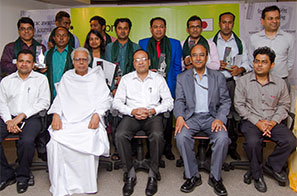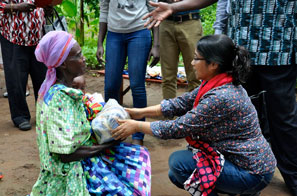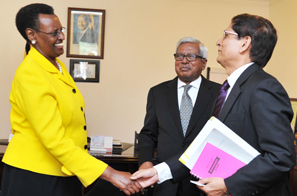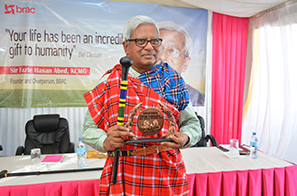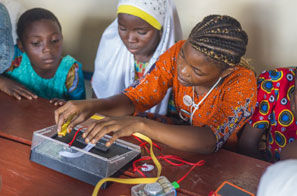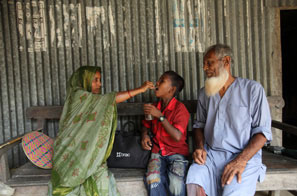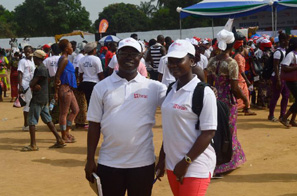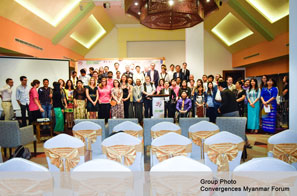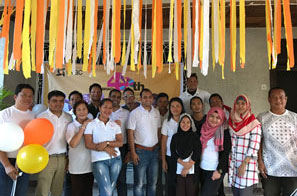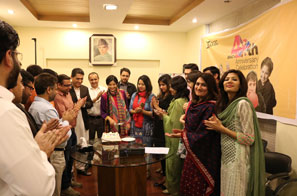
News (826)
10 journalists get Migration Media Award
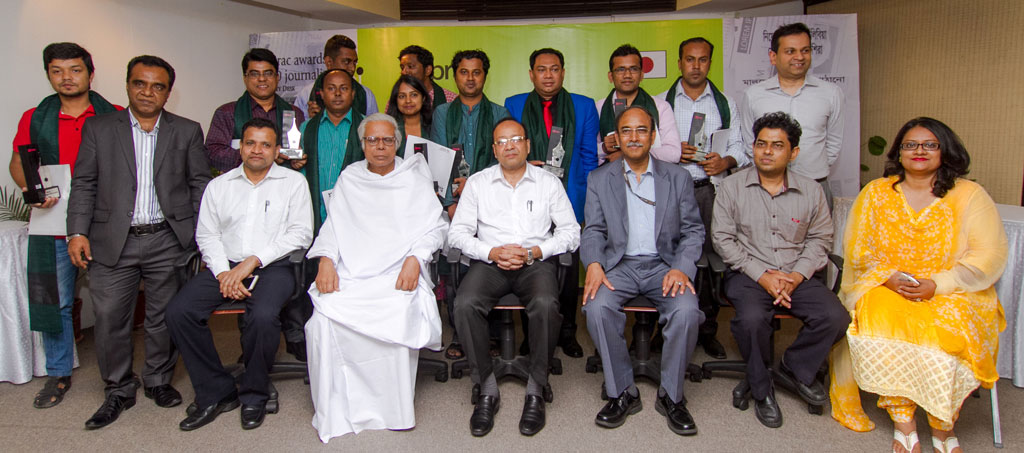
Ten media professionals received Migration Media Award 2016, an initiative of BRAC to recognise the media’s role in promoting safe migration through objective journalism. The awards were given at a ceremony organised today on Wednesday (12 April 2017) at the BRAC Centre in the Dhaka city.
The awardees are:
Print media – 1st – Belal Hossen Biplob, The Daily Star; 2nd - Adil Sakhawat, Dhaka Tribune; 3rd - Abu Jor Ansar Uddin Ahamod, The Daily Samakal.
Television report – 1st – Mashrequl Islam Rahat, Maasranga TV; 2nd – Sabina Yesmin, ATN News; 3rd – Meraj Hossen Gazi, Bangla Vision.
Television programme – 1st – Hassan Ahamed Chowdhury Kiron, for programme telecast on ATN Bangla.
Radio – 1st – Md Mustafizur Rahman, Bangladesh Betar.
Online – 1st – Md Shariful Islam Hasan, Daily Prothom Alo.
Local journalism – 1st – Faruque Ahmad, Trishal upazila correspondent, The Daily Ittefaq.
Additional secretary to the Ministry of Expatriates’ Welfare and Overseas Employment Jabed Ahmed attended the event as the chief guest with BRAC executive director Dr Muhammad Musa in chair. Noted writer and researcher Syed Abul Muksud was present as the special guest. The jury board members Syed Ishtiaque Reza, director news, 71 TV, Robaet Ferdous, associate professor, Department of Mass Communication and Journalism, Dhaka University, KM Ali Reza, deputy chief, Ministry of Expatriates’ Welfare and Overseas Employment, and Jasiya Khatoon, director, WARBE-DF, were also present. BRAC Senior director for strategy, communication and empowerment Asif Saleh moderated the event.
Additional secretary Jabed Ahmed said, ‘The government wants everyone who seeks to work abroad has skill training before migrating. But it is not easy, it is a challenging task.’
Writer and researcher Syed Abul Muksud said, ‘We should not blame the government for all that are going wrong with the migrant workers. To solve the issues the government along with individuals, civil society, recruiting agencies, NGOs and representatives from the international NGOs needs to work hand in hand.’
BRAC ED Dr Muhammad Musa called on the media professionals to focus in their work all the sides of the migrant workers’ life right from the pre-departure situations to their effort to reintegrate into the society after coming back home. Hassan Imam, programme head, BRAC Migration Programme, in his keynote paper also said the media can play an even more effective role by giving coverage to the issues migrant workers or those aspiring to go abroad face at all the phases including the realities they deal with after they return.
The 2nd National Stakeholders Workshop
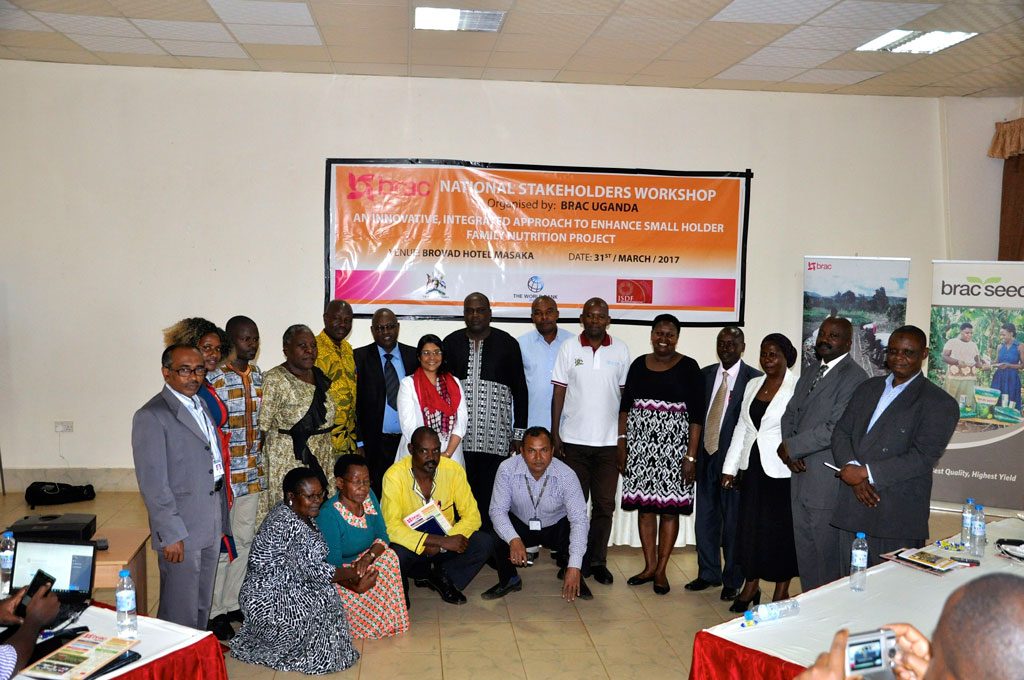 Participants at the JSDF Nutritional Project National Stakeholders Workshop
Participants at the JSDF Nutritional Project National Stakeholders Workshop
The Innovative, Integrated Approach to Enhance Smallholder Family Nutrition project, simply known as the JSDF Nutrition project, organised a stakeholder’s forum in Masaka Town, in central Uganda, to discuss nutrition and how to reduce cases of stunting among the project’s target population.
The workshop was presided over by Mr Ssansa Mugenyi, Director of Policy and Coordination at the Office of the Prime Minister. Mr Mugenyi chairs the JSDF Nutrition Project Steering Committee. Other members of the committee present were Agnes Baku, Ministry of Health, Alex Bambona, Ministry of Agriculture, and Dr. Goretti Semakula from the National Agriculture Research Organization. Stakeholders present at the half-day workshop included district health officers, district production and marketing experts, chief administrative officers and resident district commissioners, as well as farmers and BRAC volunteers.
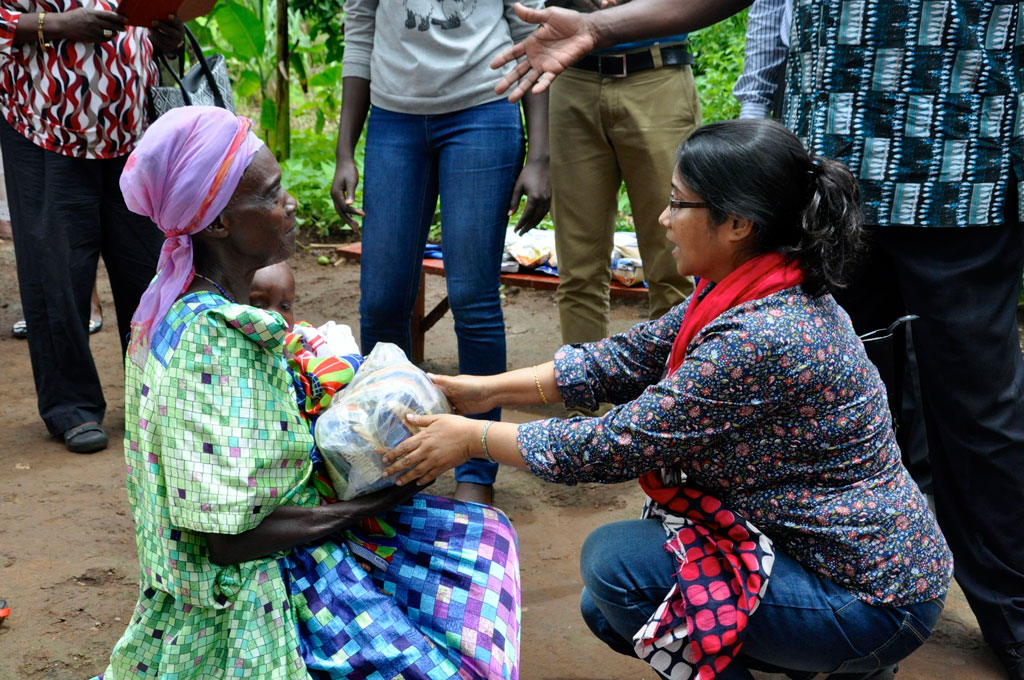 Hasina Akhter, the Country Representative for BRAC in Uganda, presents the mother of a malnourished child with fortified flour during a project health forum
Hasina Akhter, the Country Representative for BRAC in Uganda, presents the mother of a malnourished child with fortified flour during a project health forum
The previous day, the project steering committee conducted a field visit that included farmer training sessions, a health forum for mothers of under-2 children and a tour of an orange fleshed sweet potato farm.
The JSDF Nutrition project is a multisectoral intervention through which BRAC Uganda aims to improve the nutrition condition of 19,200 households in four districts through increasing the production and consumption of Vitamin-A rich foods, including the orange fleshed sweet potato (OFSP). The project combines BRAC’s agriculture, health and microfinance services and is funded by the Japan Social Development Fund (JSDF) through the World Bank.
Sir Fazle in Uganda
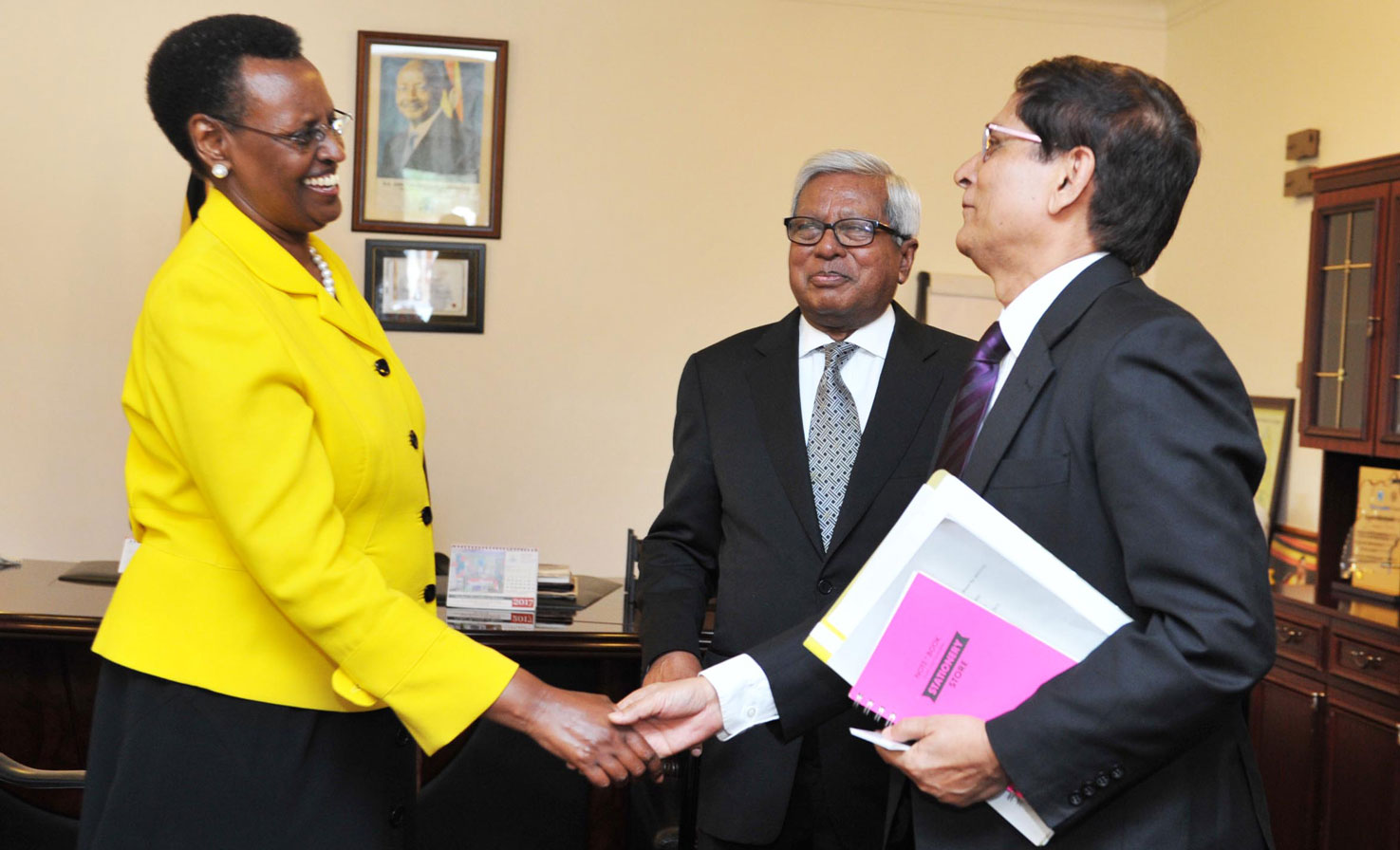
Sir Abed and Executive Director of BRAC International, Mr. Faruque Ahmed meeting Honorable Minister of Education and Sports and the First Lady of Uganda, Ms. Janet Kataha
Sir Fazle Hasan Abed visited Uganda from 11-16 March 2017. On his visit, he met various government officials including Janet Kataha, the first lady and the minister of education and sports; Dr Ruhakana Rugunda, prime minister of Uganda, and Matia Kasaija, minister of finance, economic planning and development. In addition, Sir Fazle interacted with various development partners including the World Bank country manager, Christina Malmberg Calvo; the Dutch Ambassador, Henk Jan Bakker, and representatives of UNICEF and UNFPA.
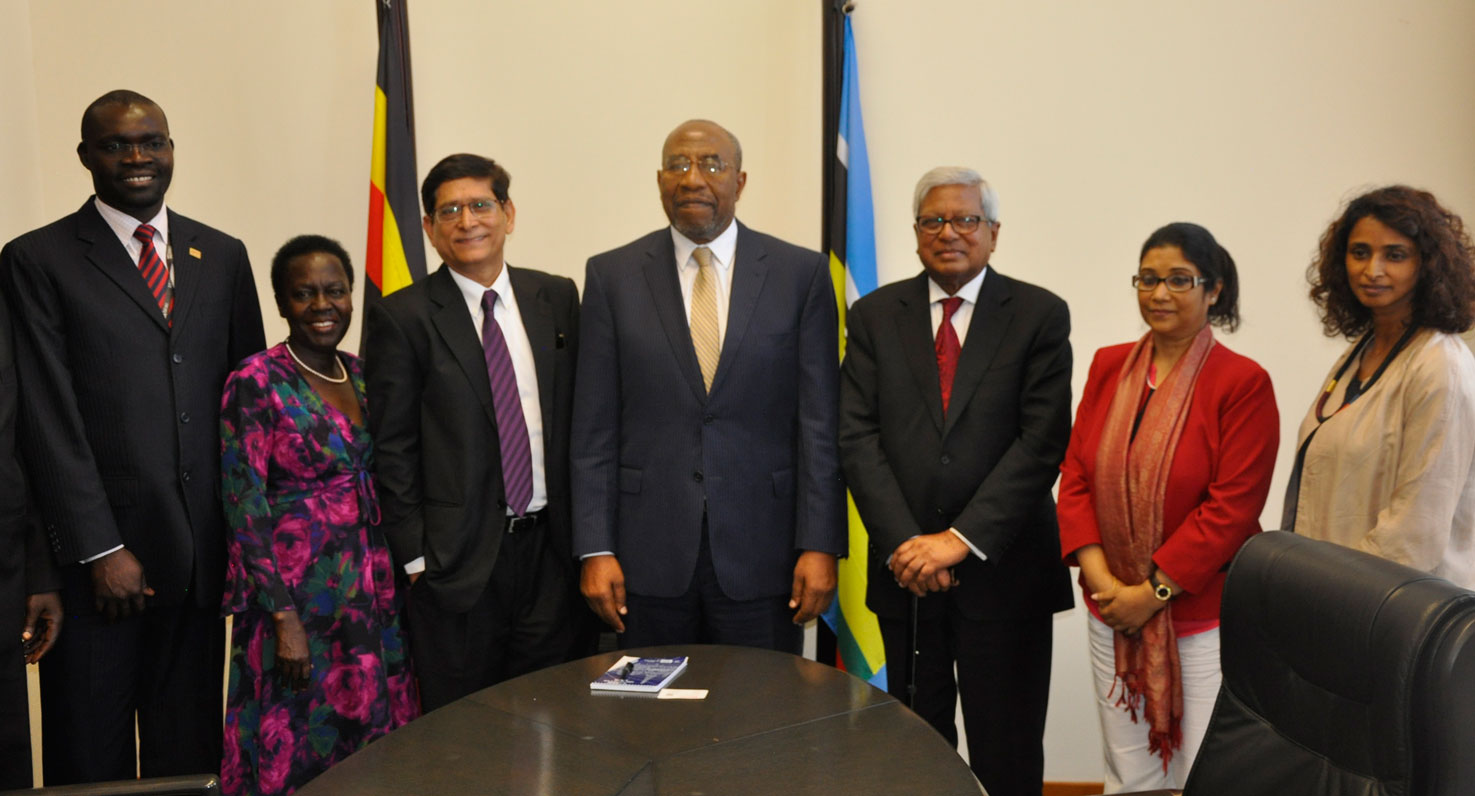
Sir Abed and senior staff of BI with Rt. Honorable Prime Minister of Uganda, Dr Ruhakana Rugunda
Sir Fazle also met prominent thinkers from the areas of agriculture, education, employment and development in Uganda.
BRAC Uganda hosted a networking dinner for Sir Fazle where representatives of development partners, universities, and the media were invited.
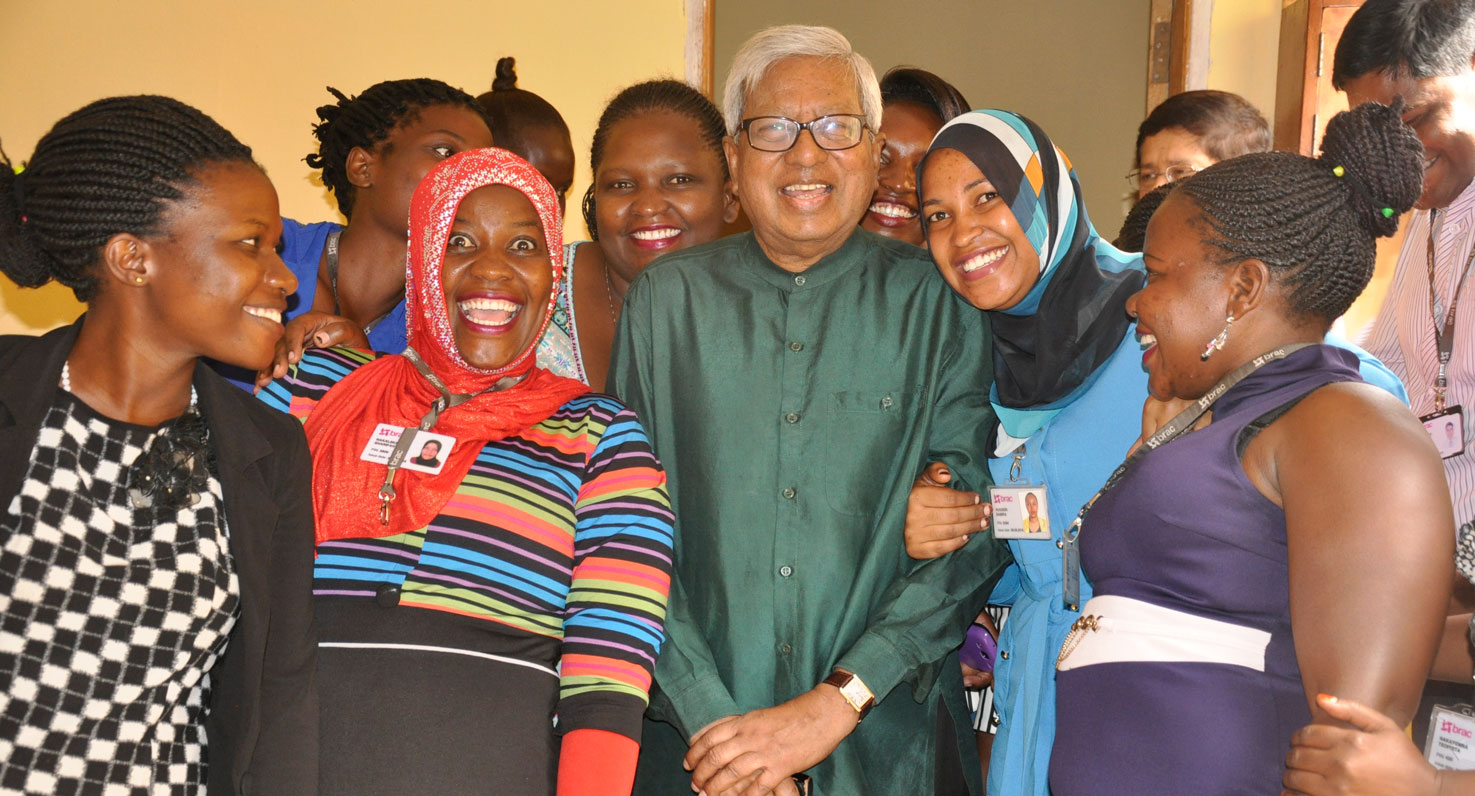
Sir Abed with BRAC Staff in Uganda
Sir Fazle also visited BRAC programmes. He visited Kasangati Branch Office, a microfinance group in Kasangati, two small enterprise clients, and St Julian High School, a partner school for the MasterCard Foundation Scholars Program at BRAC. He also visited the BRAC agriculture research and seed processing centre in Nakaseke.
Sir Fazle in Tanzania
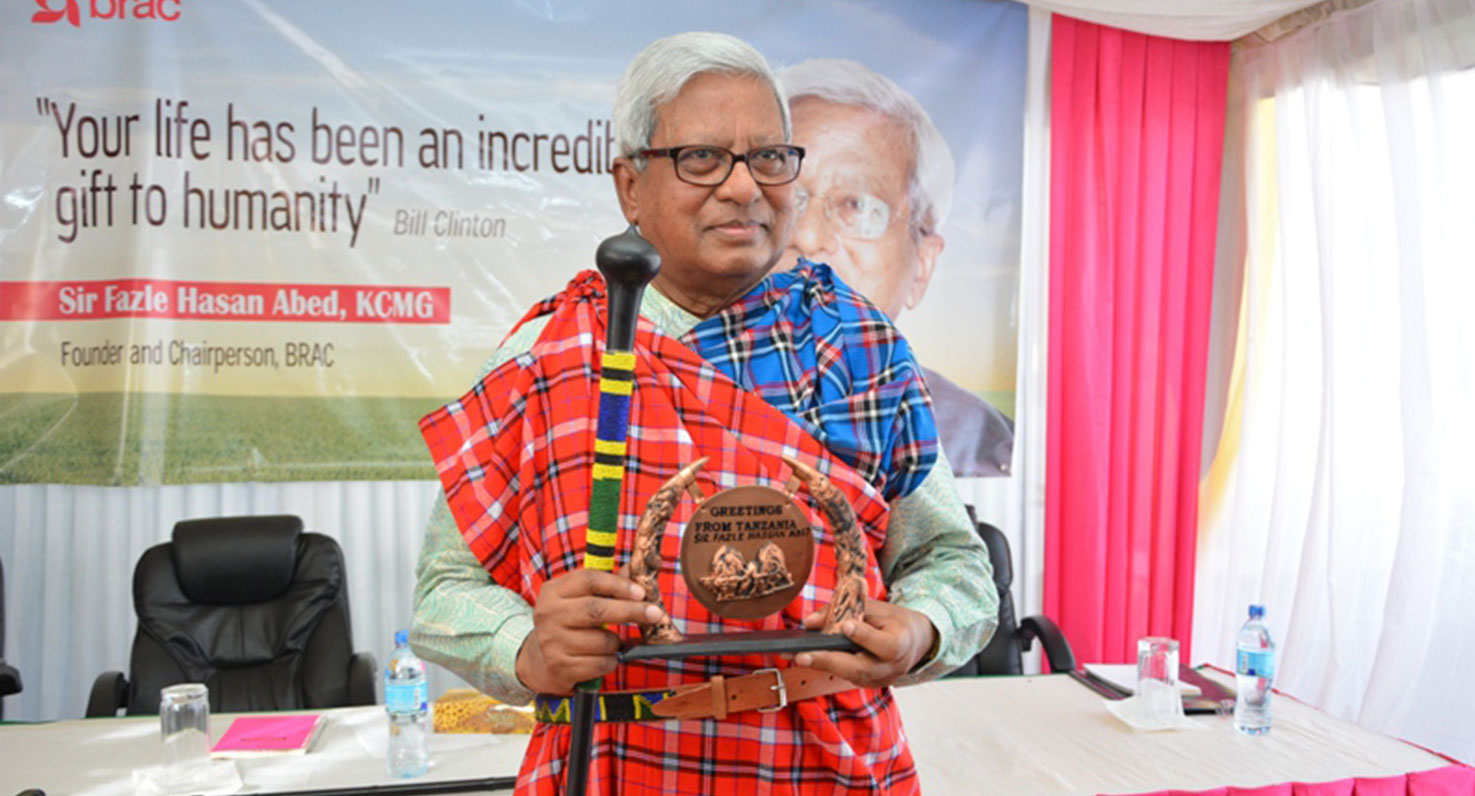
Sir Abed holding his gift after he was named Respected Elder of Tanzania by BRAC in Tanzania Staff
It was a special day for BRAC Tanzania, as the long awaited arrival of Sir Fazle Hasan Abed finally took place on 4 March 2017. His last visit was four years ago and since then a lot has changed with the addition of many new faces, most of who has only read stories of the great leader.
On his visit, Sir Fazle met with senior staff as well as the board members to discuss BRAC's role in Tanzania and the way forward. He had meetings with various potential partners, including representatives from UNICEF, and the Ambassadors of Canada, the Netherlands and Ireland.
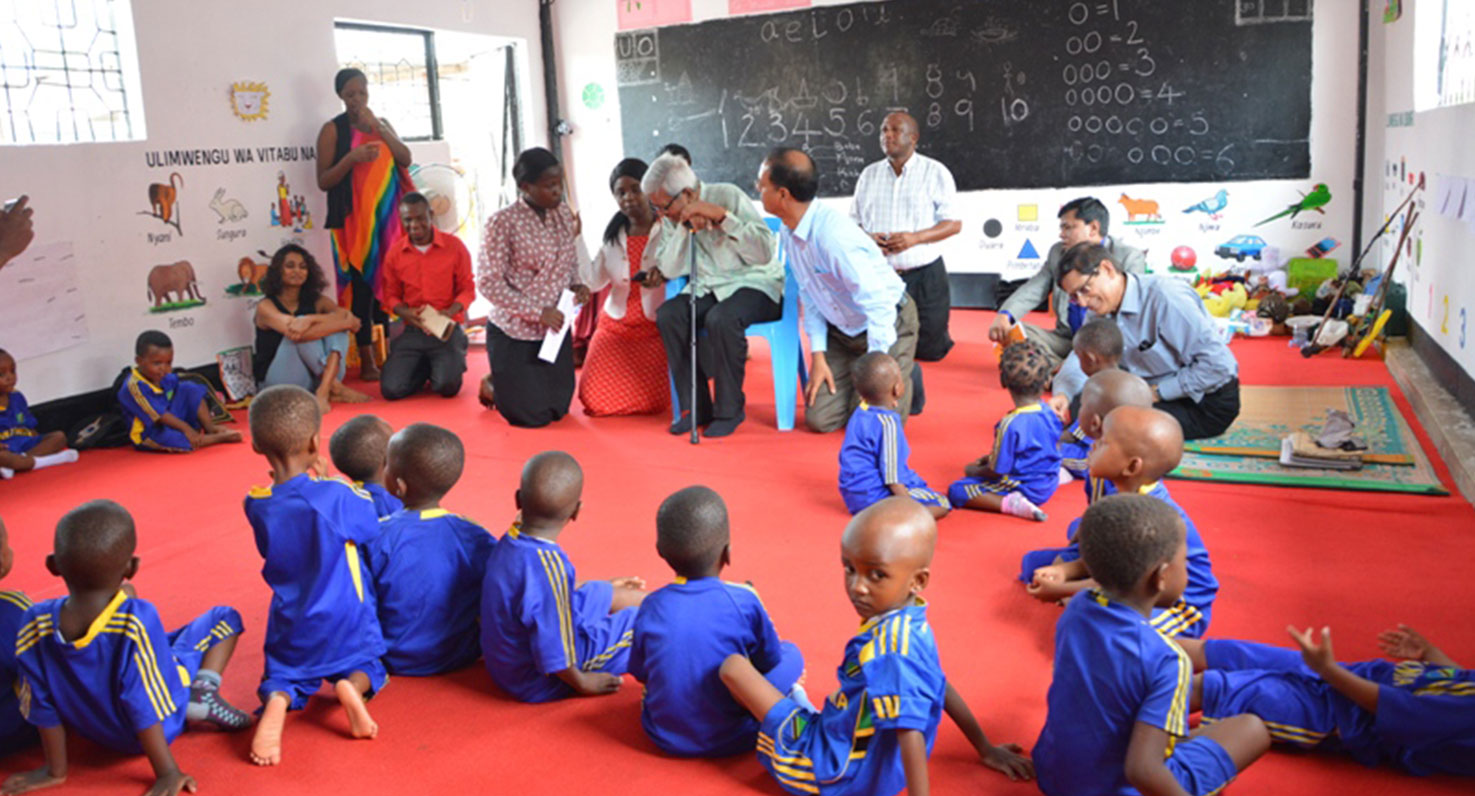
Sir Abed getting briefing from Education team when he visited Play Lab project at Temekem, Dar es salaam
Sir Fazle visited different parts of Tanzania to visit our programmes. He visited the DFID funded Girls' Education Challenge in the Mwanza region. He met with teachers from public schools and students from our in-school mentoring sessions, and visited a newly established library, courtesy of BRAC. He met with LEAD producer groups and microfinance women’s groups. The chairperson was happy to see BRAC’s impact in these communities. In Dar es Salaam, Sir Fazle was taken to visit the Play Lab Project, our latest early childhood development project.
On the final day of the visit, Sir Fazle was honoured with a surprise declaration of a Respected Elder of Tanzania. Sir Fazle was dressed in the traditional maasai outfit, a sign of acceptance in Tanzania’s elderly community.
BRAC Launched Innovative Code Clubs for Girls
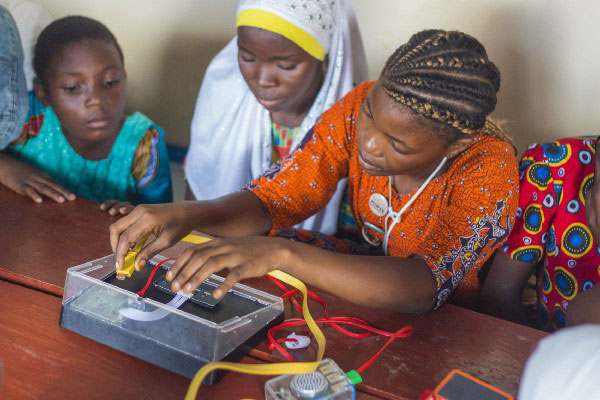
Aisha is a young, hopeful girl who wants to be a Fashion Designer. Dressed in a bright orange, breezy dress with her hair neatly tied back, she shows off the 3 badges pinned to her dress with pride. ‘Girls Code = Future’, reads the small, green badge.
The teacher then swiftly takes over and begins with an ice-breaker, asking the girls to say why they have joined the Code Clubs. Aisha explains that she wants to learn how to send e-mails and messages online. You can see the excitement and curiosity in her eyes as she waits for the lesson to begin.
“It is important for girls to learn about computers and access technology because later on in life they can be more independent,” says Aisha.
The girls are then handed out the pristine orange boxes that package the Kano kits. Carefully pealing the wrapping, Aisha pauses to take in the various gadgets and small parts before beginning to assemble the Kano computer by following the picture-book instructions.
Today is the first day Aisha will not only get to use a computer, but also learn how to build one. Typically, she spends her days staying at home to do the housework so coming to the Clubs is something for her to look forward to. BRAC in partnership with Theirworld, a global children’s charity are launching coding clubs project. Vulnerable girls and young women in Tanzania will be given unique chance to learn vital coding and technology skills in a safe space through this new innovative pilot project.
“The coding clubs will have a much broader impact in the girls’ lives that goes beyond just coding. The opportunities that coding will create for the girls in these communities are immeasurable. Most, if not all, have never even seen a computer before. An understanding of computer science is becoming increasingly essential in today’s world”. explained Amina Shaaban, the Deputy Manager for Education at BRAC
Girls and young women aged 11–25 years will learn how to build a computer, make games and artworks and express themselves with code. Integrated into the curriculum are also concepts of health and nutrition where girls reflect on their daily routines and the importance of hygiene, exercise and nutrition using online tools. The older girls also learn how to create their own websites using HTML, CSS & Java as well as gain skills for future employment and business. All girls are provided with a healthy snack.
Africa is crying out for young women with STEM skills and knowledge, coding clubs will provide these young girls a whole new window of opportunity and interest that they never had a chance to explore. Girls will be able to have a logical thought process, ability to spot mistakes and willingness to solve a problem that comes from learning to code. Said Ms. Shaaban
Code Clubs provide a safe space for girls to learn coding, foster their creative thinking and increase important business and health-related knowledge and skills to help transform their lives. The clubs are located in the Temeke district of Dar es Salaam where many girls have dropped out of school and the risk of teenage pregnancy is high.
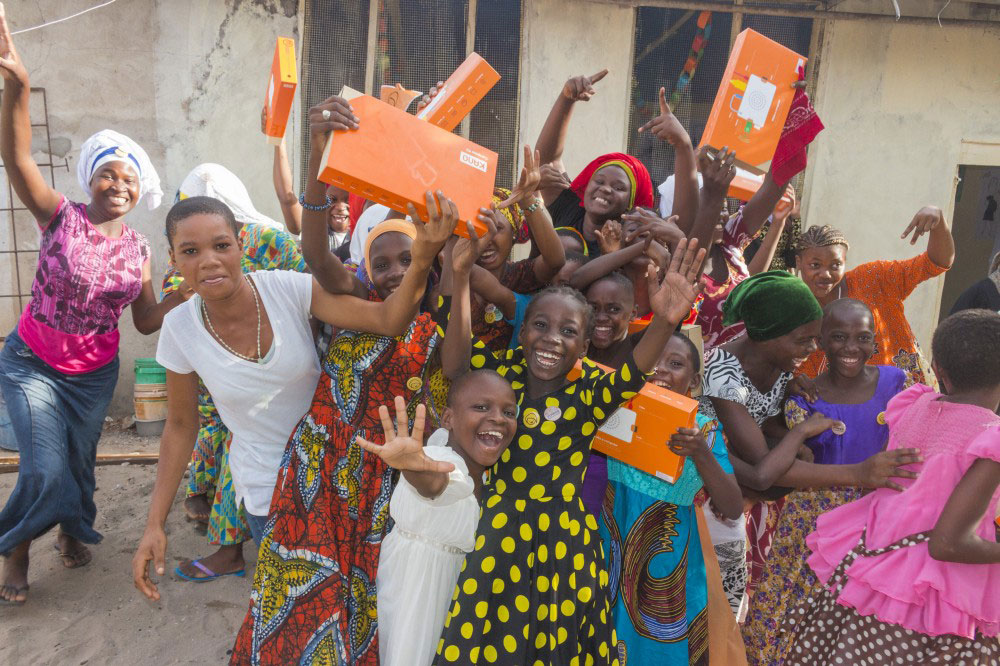
Sarah Brown, President of Theirworld says with a safe space to learn and play, a mentor to inspire, and access to technology to be able to explore, create, and code they can increase learning opportunities and empower girls to fulfill their potential.
Every girl should have the opportunity to go to school, learn, grow, and have a future they choose.
“At Theirworld, we know that investing in a girl has social and economic returns that go beyond her, extending not only to her family and future children, but also to her community. We don’t shy away from challenges and are prepared to tackle the big problems that stop children from learning,” added Sarah Brown.
Code Clubs run once a week in six month cycles. Girls will be taught a bespoke programme of online coding content by a trained teacher, and given access to numeracy, literacy, art and music to support their formal education. The Kano computer kits used in the clubs are low-cost, easily transportable, can be rebuilt multiple times and are highly applicable in countries where connectivity is low.
Child TB patients detection on the rise

The year 2016 saw a rise in the number of tuberculosis patient detection, child TB patients in particular. Use of upgraded technologies and machines enables health professionals to diagnose more patients with the infection, which has caused the rise in the number. In 2015, a total of 7,984 children were diagnosed with TB, while the number rose to 9,291 in 2016. In percentage account, child TB patient detection in 2016 was 4.3 per cent. In 2015, it was 4 per cent. In 2016 again, the total number of patients including children detected with TB stood at 2,23, 922. Of them 9,700 were multi-drug-resistant (MDR) TB patients.
Experts revealed these at a press conference today on Thursday, organised at the National Press Club on the occasion of World Tuberculosis Day 2017. Every year 24 March is observed as the World TB Day. National TB Control Programme (NTP) under the Directorate General of Health Services (DGHS) of the Ministry of Health and Family Welfare, BRAC and other partner organisations jointly arranged the press conference. The event was organised to share the successes and experiences from the TB control activities as well as the future planning in this regard. This year, the WHO released slogan for the day is 'Unite efforts to leave no one behind'.
NTP line director Dr Rouseli Haq was present as the chief guest at the press conference. Key presentation was delivered by DR-TB chief executive Dr Nazis Arefin Saki.
Deputy World Health Organisation representative Dr Edwin Salvador, national professional officer of WHO in Bangladesh Dr Vikarunnesa Begum, country project director of Management Sciences for Health Dr Oscar Cordon, senior infectious disease adviser of USAID in Bangladesh Dr Charles Lerman and programme head of BRAC TB and Malaria Control Programme Dr Shayla Islam spoke at the event, among others. A press note was also presented by BRAC's senior sector specialist for TB Dr Md Masud Rana.
Referring to the WHO Global TB Report for 2016, the experts said in Bangladesh, every year 45 patients in every one lakh (100 thousand) people die of TB, while 225 new TB patients in every one lakh are diagnosed with the infection.
They also spoke about the successes of TB treatment in Bangladesh, saying 94 per cent patients diagnosed with lung TB with germs in cough get cured.
They also said Bangladesh is ahead of the world in treating MDR-TB patients with 70 per cent success rate, compared with the world average of 52 per cent.
According to the targets Bangladesh government has set, the country will lower the rate of TB-related deaths by 95 per cent and the rate of TB prevalence by 90 per cent by 2035 than that occurred in 2015. To achieve these targets 27 NGOs are working with the government on the lead.
In the keynote Dr Najis Arefin Saki pointed out that the use of upgraded technologies has made it possible to diagnose ever more patients, taking the current rate to 61 per cent. In 2015, the rate of detection was 57 per cent. GO-NGO collaboration brought many commendable successes in TB treatment in the country, although 39 per cent of the patients remain still missing, owing to different factors.
In chief guest’s address Dr Rouseli Haq said ‘Since 1993 NTP has been working successfully, as a result of which we are now able to diagnose 77 lung TB patients with tuberculosis germs in cough out of every 1 lakh people. Out of the diagnosed TB patients 94 per cent are getting cured.’
Dr Shayla Islam said, ‘It is highly necessary now to scale up our operations in the urban areas. High population density in the cities makes TB patient detection somewhat difficult. We are now establishing a network with the private physicians to strengthen the referral system, which we hope will add pace to the whole process.’
Challenges in diagnosis and treatment of the infection that the speakers pointed out are: Shortage of health facilities to give treatment, shortage of staff with required skills, difficulty in giving treatment to floating patients living particularly in urban slums, private facilities not referring TB patients to NTP, insufficient GeneXpert machines to diagnose MDR-TB, lack of access in giving diagnosis and treatment services to people working in garment and other privately owned factories.
The NTP, BRAC and other partners will also organise a parade on 24 March World TB Day in the capital city. The parade will start at 7am at Shahbag to end at the National Press Club.
International Women's Day 2017 celebration
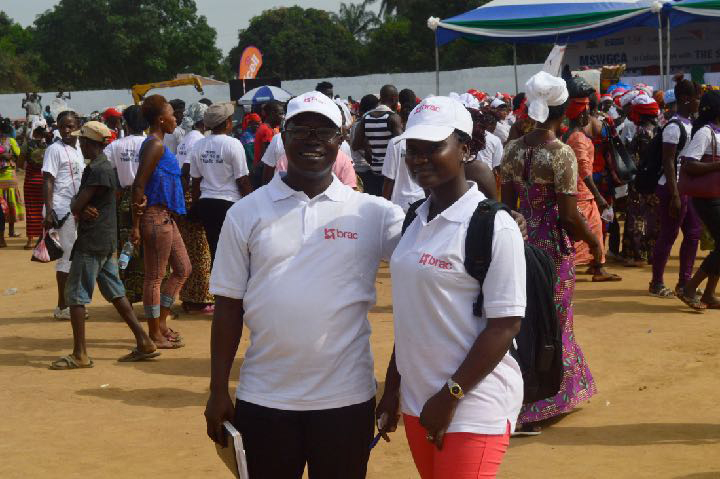 BRAC employees at the Sierra Leone national celebration of IWD 2017
BRAC employees at the Sierra Leone national celebration of IWD 2017
BRAC in Sierra Leone celebrated International Women's Day 2017 by organising an event celebrating the contributions of women at the workforce. All staff were in attendance and the there was a discussion around whether BRAC in Sierra Leone are really promoting gender mainstreaming. Going with this year's theme of "Be Bold for Change", the staff explored how BRAC is promoting women empowerment and enhancing the capacity of women and young girls for them to bring about desired change.
Members of BRAC in Sierra Leone also attended the national programme organised by the government of Sierra Leone through the ministry of Social Welfare, Gender and Children's Affairs.
Convergences Myanmar Forum 2017
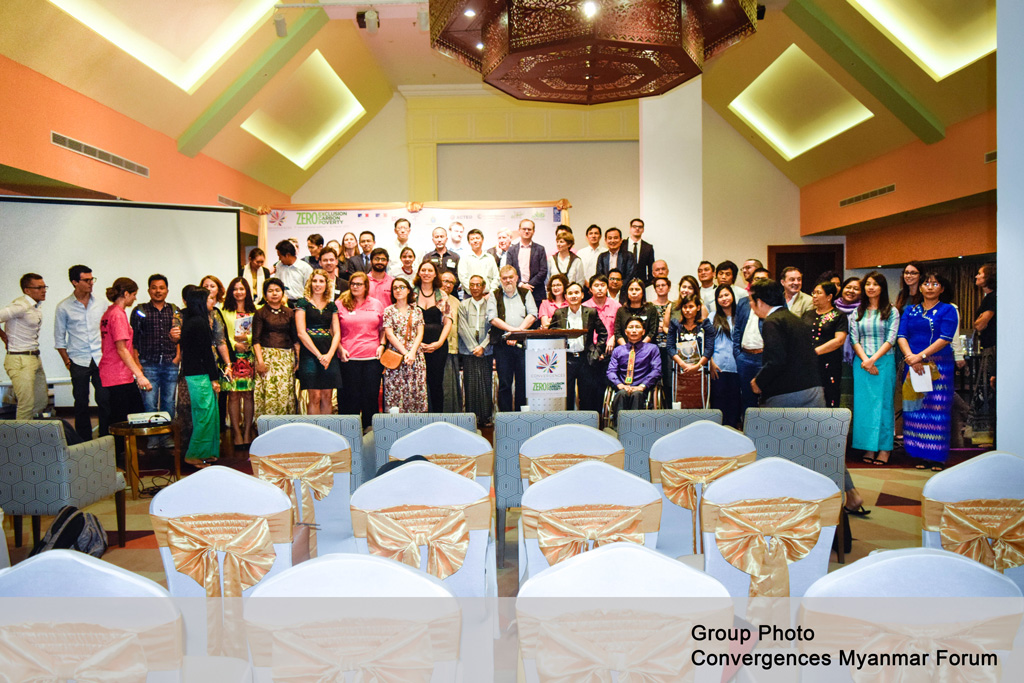
On the 10th of March BRAC Myanmar co-hosted a session on financial inclusion during the first edition of the Convergences Myanmar Forum. The theme of the session was ‘How to provide financial services for the poorest and most marginalised people?’ and the audience consisted of representatives from private organisations, NGOs and policy-makers. Lewis Temple, CEO of BRAC UK, presented BRACs ultra-poor graduation model as an illustration to the topic. Thereafter, panellists from Entrepreneurs du Monde, Dawn Myanmar, the Financial Regulatory Department, Wave Money and PGMF together with the audience discussed the challenges of reaching the poorest and how to overcome these. The speakers agreed that microcredit alone is not enough in order to reach the poorest - a more holistic approach is needed. Proposed solutions to overcome the challenges are to focus more on an integrated approach (training, support, skills development), to cooperate with and implement digital financial services and to facilitate information and knowledge sharing. All parties showed a great willingness and commitment throughout the session to cooperate toward a more financial inclusive Myanmar society.
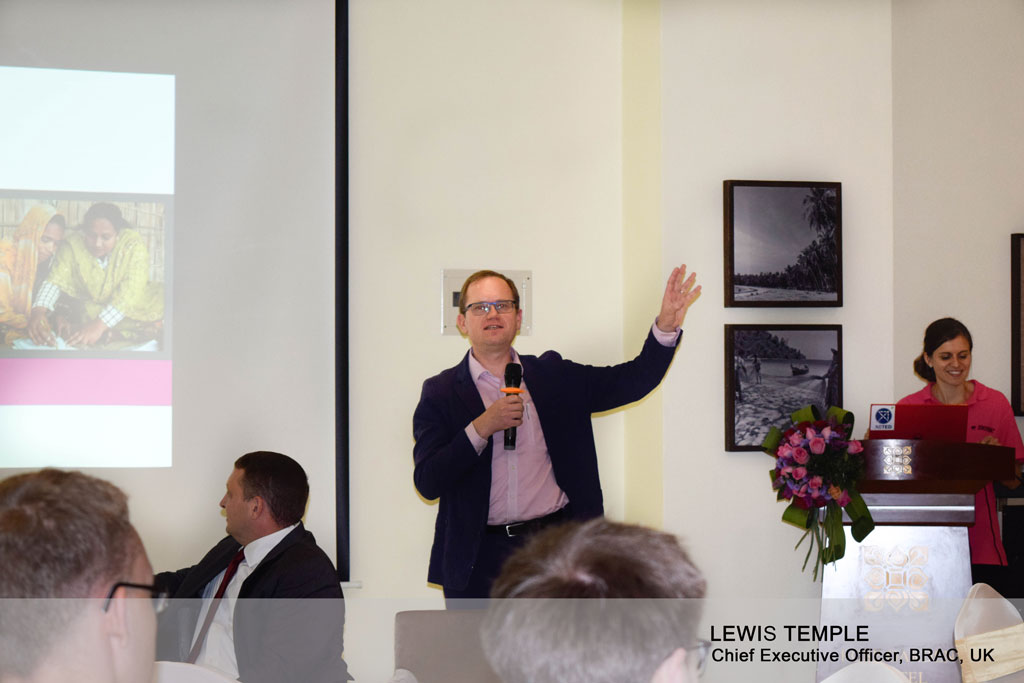
BRAC Day Celebration 2017
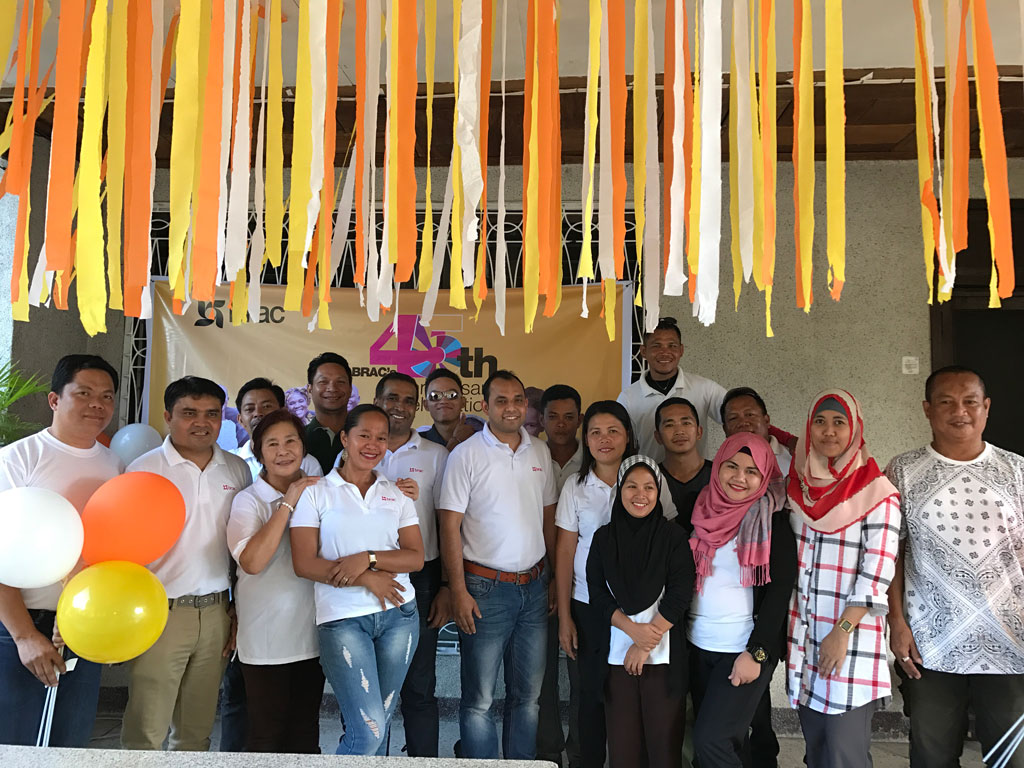
As BRAC celebrates its 45th year of supporting marginalised population around the world, BRAC Philippines remains committed to ensuring more children are brought to school, more women are employed and more communities are empowered through out interventions.
Staff of BRAC Philippines all over the Autonomous Region in Muslim Mindanao (ARMM) celebrated this joyous event to remind themselves of the goal they have worked hard to achieve through the years and the remaining work that is yet to be done for the children of ARMM.
The campaign #IamBRAC was launched on the day, encouraging staff to share their BRAC stories. One staff expressed how BRAC motivated him to work harder because of the well-established leadership structure in BRAC. Another mentioned how working at BRAC has developed her career and personality.
BRAC Philippines would like to wish the rest of BRAC a very happy BRAC Day and looking forward to another 45 years of excellent work!
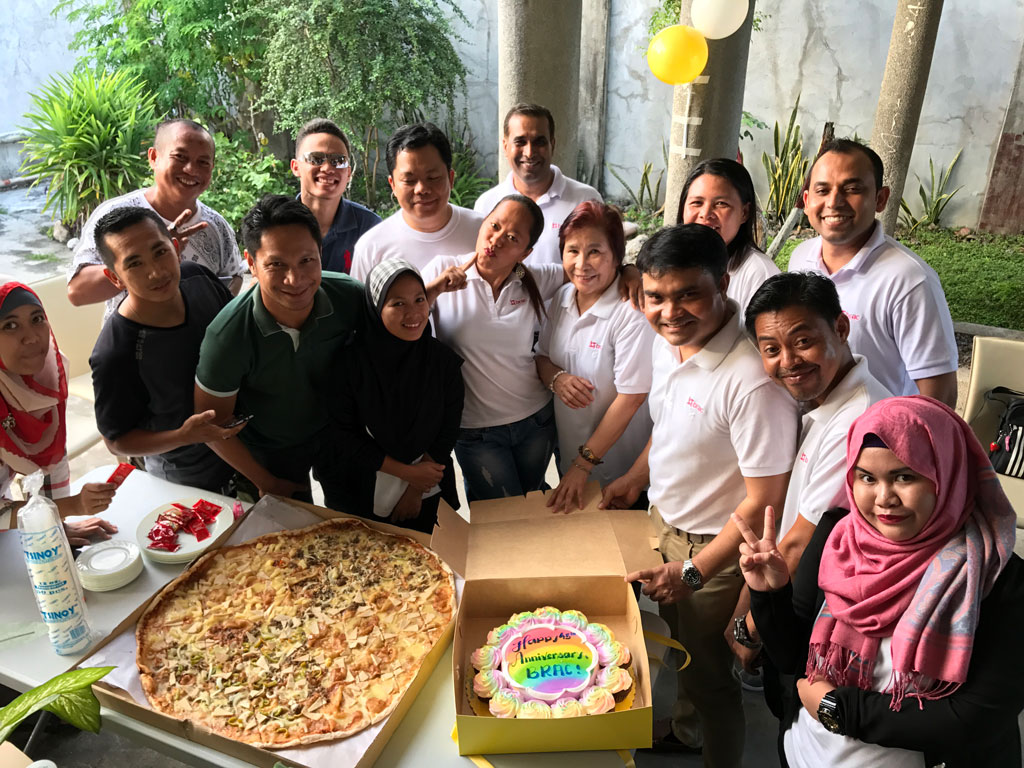
BRAC Day Celebration 2017
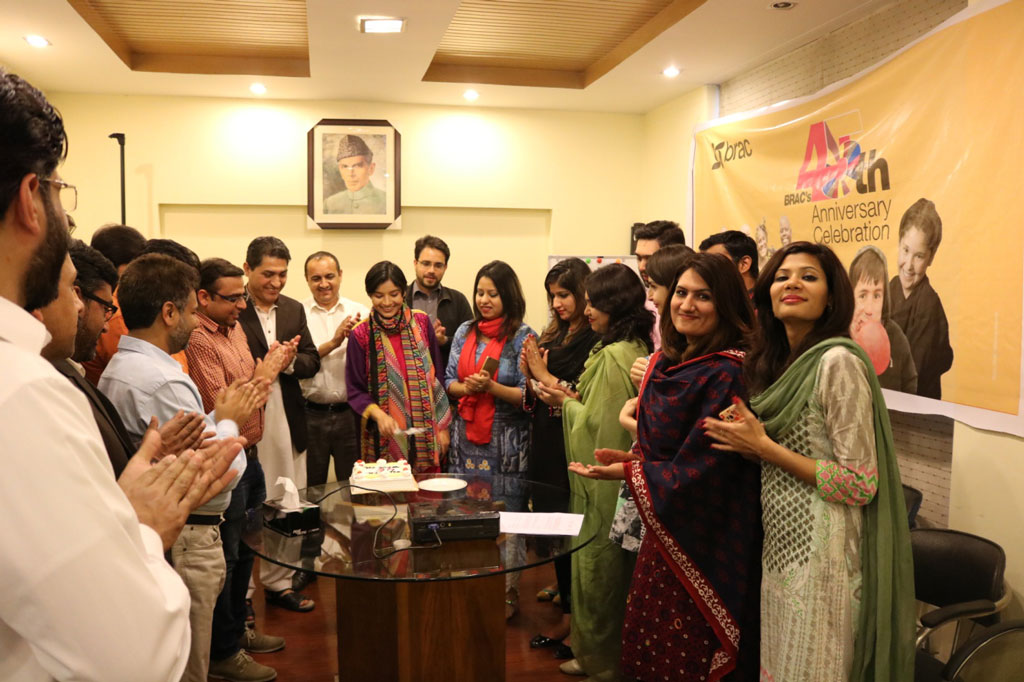 BRAC Pakistan’s newest team member cutting the 45th BRAC anniversary cake in joyful mood
BRAC Pakistan’s newest team member cutting the 45th BRAC anniversary cake in joyful mood
The 45th anniversary of BRAC was observed by all BRAC Pakistan staff to recognise BRAC’s tremendous contributions in global social development since its birth on March 21st 1972 in Bangladesh.
Celebrations were held in all main regions including at the country office in Islamabad where staff shared their stories of change and the remarkable impact BRAC has brought in their lives. Staff shared their pledges and motivation to work as BRAC’s change agents in their communities with full commitment, vigor and tenacity.
The CEO of BRAC in Pakistan Mr. Sher Zaman shared Sir Fazle Hassan Abed’s speech with the staff and stressed on laying the base of our social and development work by following in the footsteps of the great and exceptional leadership of BRAC and their community based models. While appreciating BRAC’s services for improving millions of lives living in poverty, Mr. Zaman explained BRAC's graduation model approach which helped the ultra poor climb out of poverty when its various aspects were replicated in different countries by other organisations across Asia, Africa and Latin America. A prestigious milestone indeed!
As a way forward, staff urged BRAC to bring in more innovative approaches in line with the country context to successfully translate its vision with effective and efficient solutions as there is a huge need and scope in the health and education sector in Pakistan.
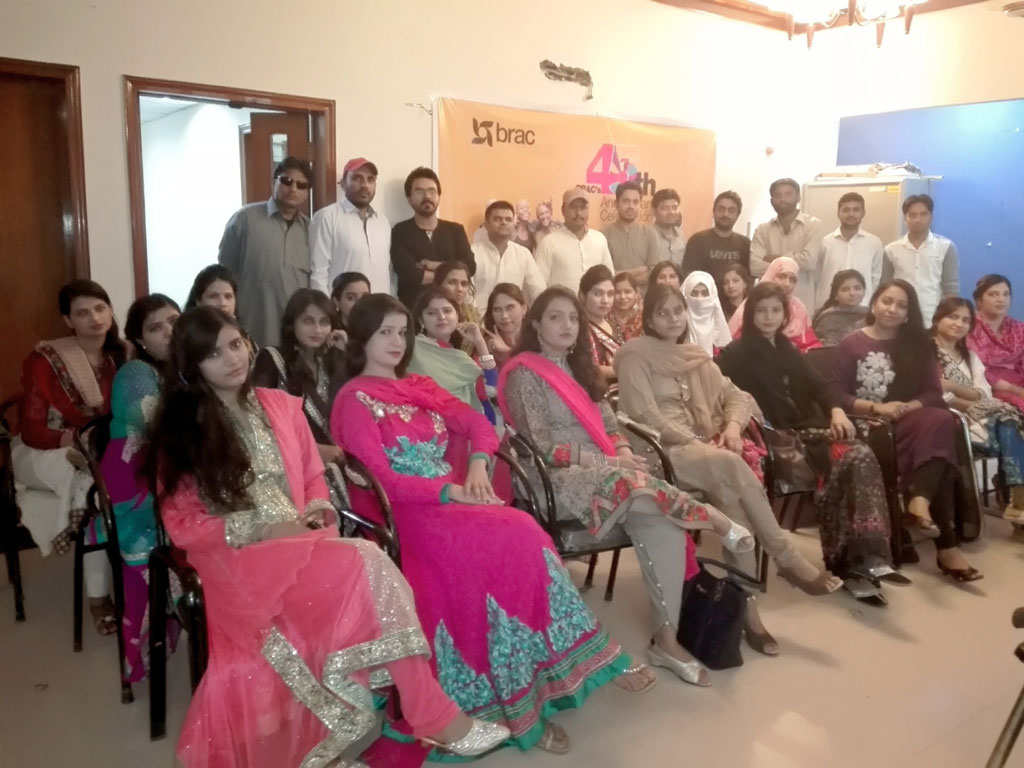 Staff of Hyderabad region in festive mood to mark 45th BRAC Day
Staff of Hyderabad region in festive mood to mark 45th BRAC Day
Join the world’s biggest family

